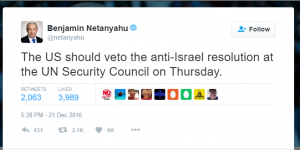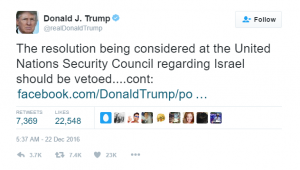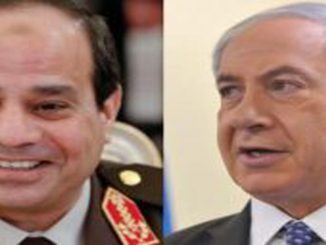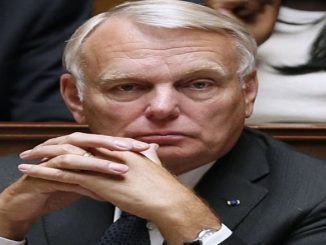
The UN Security Council was to approve a resolution demanding Israel “immediately and completely cease all settlement activities in the occupied Palestinian territory, including East Jerusalem,” two Western officials said.
Egypt’s al-Sisi delayed a UN Security Council vote on the Israeli settlements. A Western diplomat was cited by Reuters said that Al-Sisi has instructed Egypt’s U.N. mission to postpone a Security Council vote on a draft resolution demanding an end to Israeli settlements.
It is noteworthy that settlements on occupied land are considered illegal under international law.
Diplomats said that Abdel Fattah al-Sisi of Egypt put off the vote because of pressure from Israel, saying another factor may have been a fear of alienating Trump.
An Israeli diplomat said that officials in Netanyahu’s office spoke to Egyptian officials about postponing the vote.
Trump’s phone call with al-Sisi
Abdel Fattah al-Sisi has spoken on the phone with President-elect Donald Trump, amid reports that Egypt had postponed a UN Security Council resolution on Israeli settlements,according to officials from US and Egypt.
According to Reuters, al-Sisi spoke with U.S. President-Elect Donald Trump on Thursday about Egypt’s draft resolution on Israeli settlements at the U.N. Security Council as said by Sisi’s office.
The presidency spokesman Alaa Yousef said, “During the call, they discussed regional affairs and developments in the Middle East and in that context the draft resolution in front of the Security Council on the Israeli settlement.”
He also added,” “The presidents agreed on the importance of affording the new U.S. administration the full chance to deal with all dimensions of the Palestinian case with a view of achieving a full and final settlement.”
Trump declared his disapproval to the resolution and backed Netanyahu’s stance on Twitter. The Israeli Prime Minister wrote on Twitter that “The US should veto the anti-Israeli resolution at the UN Security Council on Thursday.”

In return, Trump announced on Twitter that, “The resolution being considered at the United Nations Security Council regarding Israel should be vetoed.”

Moreover, Trump argued on his Facebook page that “peace between the Israelis and the Palestinians will only come through direct negotiations between the parties, and not through the imposition of terms by the United Nations.” Trump concluded,” This puts Israel in a very poor negotiating position and is extremely unfair to all Israelis.”
In fact, Israel’s extreme-right and settler leaders have been buoyed by the election of Trump, who has already signaled a possible change in U.S. policy by tapping a fundraiser for a major Israeli settlement as Washington’s ambassador to Israel.
Obama administration criticizing settlements
Obama’s administration has highly criticized the settlement construction in the occupied West Bank and East Jerusalem.
In this context, two Western officials said that “U.S. President Barack Obama had intended to abstain from the vote, a relatively rare step by the United States to register criticism of the building on occupied land that the Palestinians want for a state,” as reported by Reuters.
Reuters cited the two officials saying that U.S. officials have voiced growing fears that a “two-state solution” is imperiled by Israeli settlement building and so have been more willing to voice open criticism of it.
“In a sign that they feared Obama might withdraw the United States’ long-standing diplomatic protection for Israel, Trump and Israeli Prime Minister Benjamin Netanyahu urged the White House to veto the draft resolution.”
It is noteworthy that the UN resolution needs nine votes in favor and no vetoes by any of the five permanent members: United States, France, Russia, Britain or China.
During the voting history in the Security Council, the United States has vetoed dozens of Security Council resolutions on Israel and it is rare for it to abstain.
In January 2009, Washington abstained on a resolution calling for ceasefire and withdrawal of Israeli forces from Gaza. This was the last time that Security Council adopted a resolution on Israel and the Palestinians.
Back in 1979 the United States and Britain abstained on a resolution focused on settlements, when the council said Israeli settlements “have no legal validity and constitute a serious obstruction to achieving a comprehensive, just and lasting peace in the Middle East.”
Al-Sisi is building close relations with Trump
Egypt’s postponement to the resolution to halt the Israeli settlements infers that al-Sisi is willing to build a constructive relationship with the news US administration.
There are many expectations that Egypt will get closer to Trump who will probably enhance U.S. support for al-Sisi, who casts his regime as a bulwark against extremist groups.
On September 20, 2016, Trump has announced his appreciation to al-Sisi and the Egyptian people because “They are defending their country and the whole world” stressing that the relations with Cairo will be strengthened once he reached power and that Egypt can rely on him.”
In the same context, Trump’s team released an account of his meeting with Sisi that was striking in how much praise the Republican heaped on Egypt. Trump expressed to al- Sisi “his strong support for Egypt’s war on terrorism, and how under a Trump administration, the United States of America will be a loyal friend, not simply an ally, that Egypt can count on in the days and years ahead”, as reported by Politico.
In addition, Trump has previously said that if elected president, he will work with Sisi to fight terrorism, describing him in a speech as someone who recognizes that “this ideology of death must be extinguished.”
On the other side, when al-Sisi was asked directly about his opinion on the US elections – during an interview with the CNN after meeting with Trump – and the possibility that Trump would make a strong leader, al-Sisi replied by saying “no doubt”.
Al-Sisi also underestimated Trump’s statements against Muslims, saying that many stances which are released during the electoral campaigns are changed later on.
On the other hand, al-Sisi seeks to maintain his relations with Israel that has flourished over the past three years.
Since the military coup led by Abdel Fattah al-Sisi against the first democratically elected President Mohamed Morsi, the relation between the al-Sisi regime and Israel has developed on the security and intelligence levels in Sinai Peninsula.
Moreover, al-Sisi regime is working on enhancing intimate diplomatic relation to open the way for full normalization. In his latest speech during the official inauguration of the Asyuit power plant, al-Sisi promised Israel “warmer” peace adding that Egypt is ready to mediate to end the Palestinian-Israeli conflict.
The latest visit by Egypt’s FM Sameh Shoukry to Israel, which was the first state visit for an Egyptian foreign minister in nine years, yet it looked like the meeting of old friends and partners.They watched football together, exaggeratedly exchanged pleasantries, and met in Jerusalem, not Tel Aviv.
In the same context, Egypt’s Foreign Minister Sameh Shoukry considered Israel practices against Palestinians within the context of “security” rather than “aggression” during a meeting with High School top students at the foreign ministry headquarters last August.
At that time , Shoukry’s statement on the Israeli policies was reported by the Israeli media as a move from the Egyptian Foreign Minister for defending Israel. “Egypt FM Defends Israel, Says Policies not Terrorism”, said the Times of Israel news heading on Shoukry’s comments.
In addition, Abdel-Fattah al-Sisi renewed his promise to fulfill warm peace to Israel if the Palestinian Israeli conflict was resolved during speaking to U.N. General Assembly last September, Al-Sisi described the Israel-Egypt model as “a real opportunity to write a bright page in the history of our region to move towards peace.
Egypt and Israel have signed a peace treaty in 1979. Before the peace accords in Camp David, the two countries had specifically fought many wars. However, since the peace treaty, wars between Israel and Arab states have stopped as Egypt came out of the scene.
Nevertheless, the Egyptian-Israeli peace has remained “cold” in the Egyptian public opinion spectrum. In 2011, Pew survey reported that 98% of Egyptians were holding anti-Semitic sentiments.
Israeli Channel 10: leaders of Israel should be grateful to Al-Sisi
In this context, Israeli Channel 10, commenting on Egypt’s withdrawal of the draft resolution prepared by the Arab group to condemn Israeli settlement:
“Sisi has saved the reputation of the settlement project, and the leaders of Israel should thank and express gratitude to President al-Sisi for this move.”



